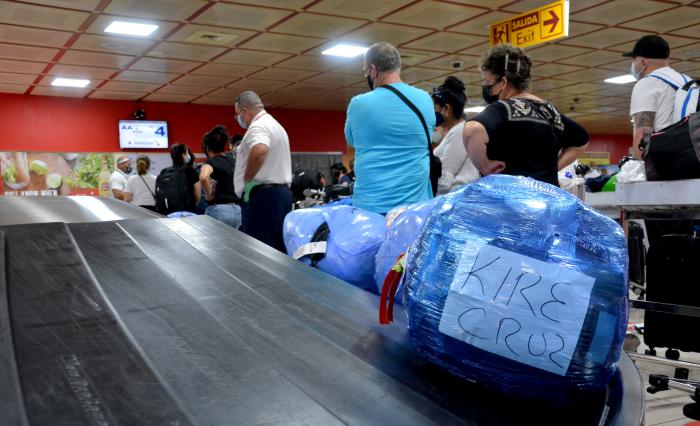The General Customs of the Republic of Cuba (AGR in Spanish) maintains a zero tolerance policy in the fight against drugs while it continues to work to reduce the time of the crossing of travelers and cargo through the country's border areas.
Nelson Cordovés Reyes, chief of the AGR, highlighted the work of those who make up the agency to ensure border security with the objective of making our country a safe destination.
Nelson Gutiérrez Acosta, director of Risk Management and Control of the AGR, pointed out that the persistence and intentionality of introducing drugs into the country, mainly through Havana's José Martí International Airport, as well as the attempt of this type of actions through the air terminals of Santiago de Cuba and Holguín, continues.
At the end of May, 20 cases of drug trafficking were detected, three more than in all of 2022, and a total of 14 kilograms of this illicit substance were seized, with cocaine predominating, ecstasy and brolamfetamine were also found, he added.
He explained that the offenders were Cubans in 12 of the cases, and eight foreigners of different nationalities and origins.
He informed that 142 cases of consumption with incidence were reported in all the airports of the country, of which 101 correspond to 136 electronic cigarettes positive for the drug (THC, cannabis oil and hashish).
On this subject, William Pérez González, deputy chief of the AGR, pointed out that, in accordance with the provisions of the Ministry of Public Health, the entry of medicines with drug-like effects is prohibited in the country.
However, he pointed out, the border health authorities have the authority to authorize these treatments as long as their use is justified and with an authorized medical prescription.
He added that, in the case of the Airport Communication Project (AIRCOP), which has been operating for a year at José Martí International Airport, the intention is to extend it to Juan Gualberto Gómez International Airport, in Varadero, Matanzas.
For this endeavor, he said, there are all the material and human resources available.
For maritime control, the AGR has two offices deployed in the country's main ports and one in Terminal 4 of the José Martí International Airport, in order to prevent the use of maritime and air cargo containers for illicit activities, particularly trafficking in drugs and their precursors.
93% OF PASSENGERS TRANSITED THROUGH THE GREEN CHANNEL
Yamila Martínez Morales, General Director of Customs Processes, explaine that 93% of the passengers arriving to the Island transited through the Green Channel (no documentary review of the declaration or physical recognition of the merchandise is required)up to May, achieving greater agility in the flow of travelers and reducing the time spent in the Customs halls.
The import capacity was also increased, through shipments of 10 kg to 20 kg, while decreasing the value of the import kilogram from 20 USD to 10 USD, which represents a 70% decrease in the payment of the customs tax.
Other actions are in the increase of the import capacity in certain articles (cell phones, computers, tablets, tires and rims, among other articles), and the quantities to be imported in most of the articles that are dispatched by their value and not by weight.
Martinez Morales added that customs actions are reduced for activities of commercial nature, as they are defined by their value and weight and by the diversity of the items to be imported, and not by the physical quantities.
Regarding the implementation of the Digital Declaration for Passengers (D'Viajeros platform), which constitutes a great advance in international facilitation; the Head of the AGR said that it is in a constant process of updating, always in function of the travelers.
On the other hand, joint work is being carried out with the Ministry of Transport and the six forwarding agencies that operate non-commercial cargo for natural persons, which has allowed the automation of postal dispatch, while direct delivery to the customer without the presence of the addressee has been implemented.
On this subject, José Luis Muñoz Toca, deputy chief of the AGR, explained that once the package arrives at a Cuban port, the time for delivery to the customer is up to 30 days.
Therefore, a periodic check of the behavior of these operations is maintained and the process of automation and exchange of electronic information Customs-Operators continues, with a view to raising the efficiency of these operations.
Tranlated by ESTI
















